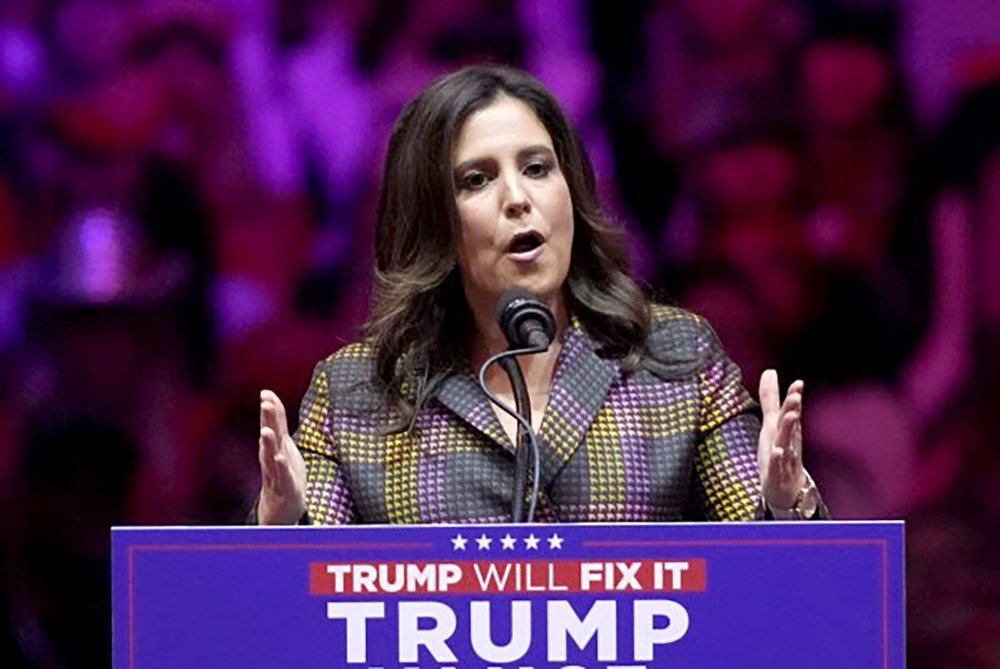|
Getting your Trinity Audio player ready...
|
Trump Withdraws Elise Stefanik’s U.N. Nomination Amid Concerns Over GOP House Majority
By: Fern Sidman
President Donald Trump on Thursday withdrew his nomination of Rep. Elise Stefanik as U.S. ambassador to the United Nations, NBC reported
Trump cited the razor-thin majority that Republicans hold in the House of Representatives for his decision to pull Stefanik’s name from consideration by the Senate for the U.N. post.
President Donald Trump was reportedly weighing the withdrawal of Rep. Elise Stefanik’s nomination as U.S. ambassador to the United Nations, amid intensifying concerns about the Republican Party’s slim majority in the House of Representatives. As reported by USA Today on Thursday, this reversal speaks volumes about the difficult balancing act Trump faces between staffing his administration and maintaining political leverage in Congress.
Rep. Stefanik, a Republican from New York and a key Trump ally, has seen her career caught in political purgatory since Trump tapped her for the U.N. role in November, just days after he won re-election. While the nomination elevated her stature on the national stage and reaffirmed her status as a top Trump loyalist, it had also placed her in an awkward holding pattern
According to the USA Today report, she continues to serve in the House while awaiting Senate confirmation—a vote that GOP leaders have repeatedly delayed.
The delay is not accidental. Speaker Mike Johnson and House Republican leaders have kept Stefanik in place, needing her vote on critical legislation. Most recently, her presence in the House proved vital for passing bills to prevent a government shutdown and to set the legislative groundwork for implementing Trump’s second-term agenda. With Republicans holding the House by the slimmest of margins—218 to 213, with four seats currently vacant—every vote counts. The USA Today report noted that this razor-thin margin leaves little room for error or absenteeism within GOP ranks.
Two of the four House vacancies—left by Republicans Michael Waltz and Matt Gaetz—will be decided in upcoming special elections in Florida. These races carry significant weight for House Republicans and influenced Trump’s ultimate decision on Stefanik’s nomination. According to the information provided in the USA Today report, Waltz has left Congress to serve as Trump’s national security adviser, while Gaetz withdrew his own Cabinet nomination amid sexual misconduct allegations and has since pivoted to a career in television.
CBS News was the first to report that Stefanik’s nomination was in jeopardy, while Reuters, citing a White House official, confirmed that internal discussions are ongoing regarding whether the congresswoman should formally withdraw from consideration. As of publication, Stefanik’s office has not responded to media inquiries, USA Today reported.
The nomination of Stefanik—once floated as a possible vice presidential candidate—was seen as an effort by Trump to insert loyalists into key diplomatic roles while reshaping the U.S. relationship with multilateral institutions. Yet, Trump has made no secret of his deep skepticism toward the United Nations. In remarks cited by USA Today, Trump declared in February that the U.N. has “great potential,” but warned that “they got to get their act together.”
In response, U.N. Secretary-General António Guterres defended the organization, stressing his administration’s ongoing reform efforts—a reflection of the widening chasm between Trump and the U.N. establishment.
Since returning to office on January 20, Trump has taken several steps to further distance the United States from U.N.-affiliated bodies. The USA Today report detailed Trump’s decisions to withdraw from the U.N. Human Rights Council, suspend funding to the Palestinian relief agency UNRWA, and order a review of U.S. involvement in UNESCO, the U.N.’s cultural agency. Additionally, the U.S. has announced its intention to leave the Paris Climate Agreement and the World Health Organization.
If Trump decides to withdraw Stefanik’s nomination, it would reflect a broader strategy of prioritizing legislative survival over diplomatic appointments—at least in the short term. The move would also reaffirm the primacy of domestic politics in Trump’s second-term playbook.
The unfolding drama surrounding Stefanik’s nomination reveals the fragile equilibrium Trump must maintain between ideological fidelity and practical governance. Whether Stefanik remains in Congress or took on a global platform at the U.N., her fate was shaped less by foreign policy considerations than by the raw arithmetic of House votes and Trump’s own long-term ambitions.
As the situation develops, all eyes remain on Tuesday’s special elections and the high-stakes decisions emerging from within Trump’s inner circle—each of which could tip the balance in a precariously divided Washington.




